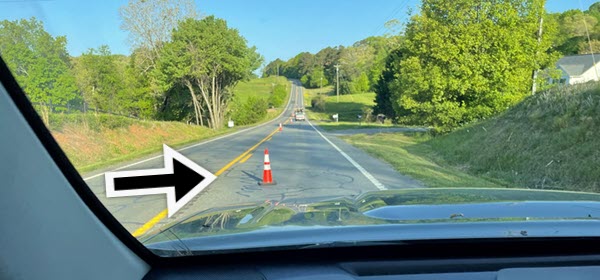As an accountant or bookkeeper, you know that accuracy is king. But is it always king? Or are there times when accuracy could be more like a court page?
Recently, I followed a construction crew down the street where they were preparing to re-pave. I was behind the team responsible for putting traffic cones in the middle of the two-lane road so that cars could be piloted on one side while the road crew worked on the other side.

In this picture, you can see a man in yellow hanging off the back of the truck. His job was to lift a traffic cone out of the bed of the truck and put it down on the road. It was interesting to watch. He had quite the flair.
He would hold the cone above the road in the air. Then, as he lowered the cone, he gave it a bit of a spin.
Unfortunately, the spin caused the cone to move from where it appeared that he was trying to place it. In the picture above, you can see that the cone placement isn't bad at all. However, ...

After placing only about ten cones, one of them spun so much that it moved quite a bit from the center line. With the compact car in front of me, there really wasn't much of a consequence. The driver just slid over and made it by with no problem.

On the other hand, I drive a mid-sized truck. To get by, I had to drive with my right tires on the edge of the road and the grass. Not world-shattering.
But then I got to thinking. What about tractor trailers? Or worse, what if a wide load needed to make it down our small country road?
And that those thoughts led me to musings about accuracy and business.
What is the cost of inaccuracies?
For accountants and bookkeepers, we obviously don't tolerate inaccuracies in the accounting work we do. However, what about inaccuracies in other places?
For the Department of Transportation (DOT), not that they thought this through I'm sure, they could analyze the cost of reducing the speed of the truck so that the worker could place the cones more precisely versus the increased safety of ensuring the cones were properly placed. They would probably consider factors such as how frequently the road is traveled in general and how many tractor trailers would likely travel down the road during the period when the stretch of road was being worked. They then might compute the potential damage if a big rig caught its wheels in the grass and got stuck or, heaven forbid, tip over.
In other words, the DOT would need to weigh potential adverse outcomes against the savings of reducing or eliminating accuracy. Instead, the team was probably just focused on getting the job done.
The same calculations need to be made by all businesses. In some cases, the potential adverse outcomes are so egregious that increasing or guaranteeing accuracy is vital to the company's future. But for other businesses, the potential adverse outcomes may be less daunting.
In either case, you need to decide between being accurate or just getting the job done. One example you might consider as an accountant or bookkeeper is the act of sending emails to clients.
What if you sent an email to a client that had misspelled words or poor grammar? They may or may not notice the errors. If they do notice, they might just chalk it up to you being busy. On the other hand, there is a chance that it might affect their respect for you, your knowledge, and your professionalism. Even if it does affect their opinion of you, you most likely will be able to overcome the cost by improved accuracy going forward.
On the other hand, what if you sent an email containing sensitive client information to the wrong client? This is a completely different story. In your cost analysis of inaccuracy, you will need to consider more significant outcomes.
What is your tolerance for risk?
It all comes down to your tolerance for risk.
If being inaccurate in a certain situation could cause an adverse outcome that you are willing to accept, then you may choose to spend less effort ensuring accuracy.
If being inaccurate in a certain situation could cause an adverse outcome that you would never be willing to accept, then you need to develop procedures, processes and even checklists to make sure that you are 100% accurate.
The choice is yours.
.png?width=150&height=63&name=TWRlogo-regmark_blueblack%20(1).png)
.png)









Do you have questions about this article? Email us and let us know > info@woodard.com
Comments: